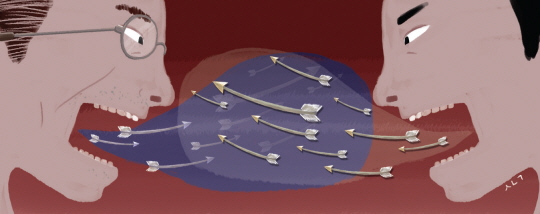 Fr. Kim is considered a good priest by his parishioners. He doesn't get upset and treats all the parishioners kindly. He doesn't take sides in disputes in society and wants to avoid showing any preferences with problems of society. Even when there are positions to be promoted if there are objections he avoids them. He doesn't like conflict among believers, he wants quiet and peace.
Fr. Kim is considered a good priest by his parishioners. He doesn't get upset and treats all the parishioners kindly. He doesn't take sides in disputes in society and wants to avoid showing any preferences with problems of society. Even when there are positions to be promoted if there are objections he avoids them. He doesn't like conflict among believers, he wants quiet and peace. A retired priest who was active in social justice, writes in a bulletin for priests on taking sides and introduces the article with the above as the first paragraph. He reminds the readers that we have parishioners who criticize this attitude in their priests. It's not black or white but always grey; he doesn't want to go deeply into problems. Fr. Kim doesn't concern himself with these differences of opinions within the parish but they continue to exist.
If nobody has problems with the priest, maybe something needs to be corrected. Possible too much effort trying to please everybody without any deep conviction of what we are called to do. The writer has met persons who are not happy with those who see no problems in life and all is hunkey-dory. Maybe there is a need for us to reflect on this position with a little more deliberation.
There is a large company in Fr. Kim's parish, and because of labor disputes it was noisy. Workers demonstrated and some were taken to the police station. A member of the pastoral council of the parish recommended that the priest mention it to the community since it happened in the parish. The council took the side of the workers.
The parish priest heard his side of the story and said: "You must be fair. You have to listen to both sides of the story. There are always right and wrong on both sides. Christian faith is not about raising conflict, but about reconciliation, forgiveness, and peace."
Is this the entire teaching of Jesus? But reconciliation and forgiveness apply in most cases to personal conflicts. Many conflicts and struggles are not private. Some conflicts are wrong on one side and right on the other. One side is unfair and oppressive, and the other suffering from injustice and oppression.
In such cases, it is a mistake not to choose one side over the other. In this case, neutral is to accept the current immoral situation. In a situation of suffering, silence will tolerate the condition and stand on the side of the oppressor. We are not to reconcile good and evil, justice and injustice, but to work against evil and unrighteousness as Christians. Granted that this needs to be done civilly, with dialog and openness.
When Pope Francis came to Korea, he gave a good example of what is demanded from us. At that time, there was a serious conflict between the government and the family of over 300 who died in the Sewol ferry disaster in 2014. It was one of the worst peacetime disasters that led to criminal convictions.
At that time, the pope said to those on the side of the government who were calling for neutrality: "neutrality is not correct when you have those suffering." The Pope met with the families of the Sewol six times. And he wore a yellow ribbon in support of the family members.
Jesus' peace is not an orderly and quiet peace, but a peace based on truth, justice, and love. The peace that the world presents us is a superficial peace that distorts truth and conceals injustice to achieve cleverly selfish purposes. Jesus emphasized the inevitability of conflict in order to break this false peace and achieve true peace.





